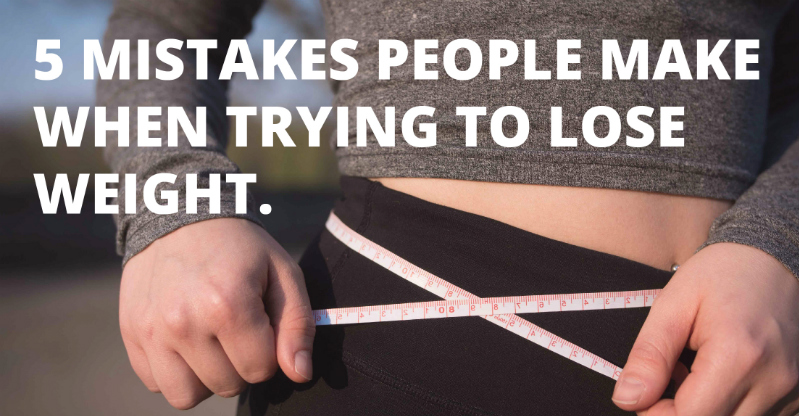Hey there! Losing weight can feel like a daunting journey, but you’re not alone. In “Common Mistakes to Avoid When Trying to Lose Weight,” you’ll uncover some of the most frequent pitfalls that can derail your progress. From skipping meals to relying on fad diets, this article will help you navigate the tricky landscape of weight loss with tips that keep you on the right track. Let’s make this journey a little bit easier together by identifying and steering clear of these common mistakes. Have you ever wondered why some weight loss plans fail, even when you’re putting in your best effort? The journey to losing weight can be challenging, and it’s not uncommon to make mistakes along the way. Recognizing these mistakes early can help you avoid them and keep you on track toward reaching your goals. Let’s dive into the common mistakes to avoid when trying to lose weight, so you can make your path to a healthier lifestyle as smooth as possible.

Unrealistic Expectations
Setting Unachievable Goals
One of the first mistakes people make is setting goals that are too ambitious. You might want to lose 20 pounds in a month, but that’s not only unrealistic, it’s also unhealthy.
- Short-term Goals: Focus on losing 1-2 pounds per week.
- Long-term Goals: Aim for 10% of your body weight over a 6-month period.
| Goal Type | Recommended Pace |
|---|---|
| Short-term | 1-2 pounds per week |
| Long-term | 10% of body weight over a 6-month period |
Expecting Instant Results
Weight loss is not an overnight process. Expecting rapid results can lead to frustration and disappointment.
- Patience: Understand that slow and steady wins the race.
- Consistency: Stay consistent in your efforts, and results will follow.
Inadequate Nutrition
Skipping Meals
Skipping meals is a common mistake many people make, often thinking it will help them lose weight faster. In fact, this can have the opposite effect.
- Metabolism: Skipping meals can slow down your metabolism.
- Blood Sugar Levels: It can also lead to unstable blood sugar levels, causing cravings and overeating later.
Poor Food Choices
Not all calories are created equal. Focusing purely on caloric intake and not on nutrient quality can sabotage your weight loss efforts.
- Processed Foods: Avoid foods that are high in sugar, salt, and unhealthy fats.
- Whole Foods: Opt for whole, unprocessed foods that provide essential nutrients your body needs.
| Food Type | Examples | Benefits |
|---|---|---|
| Processed Foods | Chips, soda, candy | High in sugars and unhealthy fats |
| Whole Foods | Fruits, vegetables, lean meats | Nutrient-dense and low in sugars |
Not Eating Enough Protein
Protein is crucial for weight loss as it boosts metabolism, reduces appetite, and aids in muscle maintenance.
- Daily Intake: Aim for at least 20-30 grams of protein per meal.
Overlooking Exercise
Doing Too Much, Too Soon
Diving into an intense workout regimen too quickly can lead to burnout and injuries.
- Gradual Increase: Start with moderate exercises and gradually increase the intensity.
- Variety: Incorporate a mix of cardio, strength training, and flexibility exercises.
Ignoring Strength Training
Cardio alone won’t give you the best results. Strength training is essential for building muscle, which in turn helps you burn more calories even at rest.
- Balanced Routine: Combine cardio with strength training exercises.
- Muscle Gain: Remember that muscle weighs more than fat, so focus on inches lost rather than pounds.
Psychological Factors
Emotional Eating
Using food as a coping mechanism for emotional stress can derail your weight loss efforts.
- Mindful Eating: Pay attention to what and why you’re eating.
- Alternative Coping Mechanisms: Find other ways to deal with stress, such as exercise or talking to a friend.
Lack of Support
Having a support system can make a significant difference in your weight loss journey.
- Accountability Partners: Find friends or family members who can offer support and motivation.
- Professional Help: Consider seeing a dietitian or a therapist if you find it challenging to stay on track.

Misguided Mindset
All-or-Nothing Attitude
Believing that you have to be perfect all the time can be discouraging if you slip up.
- Flexibility: Allow yourself some room for occasional treats.
- Balance: Focus on overall progress rather than day-to-day perfection.
Comparing Yourself to Others
Everyone’s weight loss journey is unique. Comparing yourself to others can create unnecessary pressure and disappointment.
- Personal Goals: Focus on your goals and progress, not someone else’s.
- Celebrate Wins: Celebrate your achievements, no matter how small.
Misunderstanding Caloric Intake
Underestimating Portion Sizes
Many people think they are eating less than they actually are due to incorrect portion sizes.
- Measure Portions: Use measuring cups, food scales, and serving size recommendations to ensure accuracy.
- Mindful Eating: Be aware of what you’re eating and how much.
Neglecting Liquid Calories
Beverages can be a hidden source of extra calories, often overlooked when tracking daily intake.
- Water: Stick to water, which is calorie-free.
- Limited Portions: If you do consume caloric beverages, limit their intake.
| Beverage Type | Calories Per Serving |
|---|---|
| Soda | ~150 calories per 12 oz |
| Fruit Juice | ~110 calories per 8 oz |
| Water | 0 calories |

Inadequate Sleep
Neglecting Sleep’s Role
Sleep is often overlooked but is a crucial factor in weight loss. Lack of sleep can interfere with hunger hormones and increase cravings.
- Sleep Schedule: Aim for 7-9 hours of quality sleep per night.
- Sleep Hygiene: Establish a bedtime routine to improve your sleep quality.
Napping Too Much
While naps can be refreshing, excessive napping can disrupt your nightly sleep, affecting your weight loss efforts.
- Short Naps: Keep naps short, ideally 20-30 minutes.
- Scheduled Naps: Avoid napping too late in the day.
Misreading Hunger Cues
Thirst vs. Hunger
Sometimes thirst is mistaken for hunger, leading to unnecessary snacking.
- Hydration: Drink water regularly and assess if you’re truly hungry or just thirsty.
Ignoring Satiety Signals
Eating past the point of fullness can contribute to weight gain.
- Slow Eating: Take your time to eat and allow your body to signal when it’s full.
- Mindfulness: Be mindful of your body’s signals and stop eating when you’re satisfied, not stuffed.

Over-reliance on Diet Products
Trusting Labels
Many products marketed as “diet” or “low-fat” can be misleading.
- Ingredient Check: Always read the ingredient list, not just the front label.
- Whole Foods: Favor whole foods over processed diet products.
Excessive Use of Supplements
While supplements can aid in certain deficiencies, relying heavily on them instead of a balanced diet is a mistake.
- Balanced Diet: Aim to get nutrients from whole foods before considering supplements.
- Professional Advice: Consult health professionals before starting any supplementation.
Social Pressures
Peer Pressure
Social situations can make it challenging to make healthy choices.
- Preparation: Prepare to handle pressure by planning ahead.
- Communication: Politely communicate your goals to friends and family.
Eating Out Frequently
Dining out often can lead to consuming high-calorie, nutrient-poor meals.
- Healthier Choices: Opt for grilled instead of fried, and salads instead of fries.
- Moderation: Try to limit eating out and cook at home more often.

Conclusion
Losing weight is a complex journey that involves more than just eating less and exercising more. Understanding and avoiding these common mistakes can make your path to weight loss smoother and more sustainable. Remember, every step you take is progress. Be kind to yourself, stay consistent, and you’ll reach your goals. You’ve got this!
